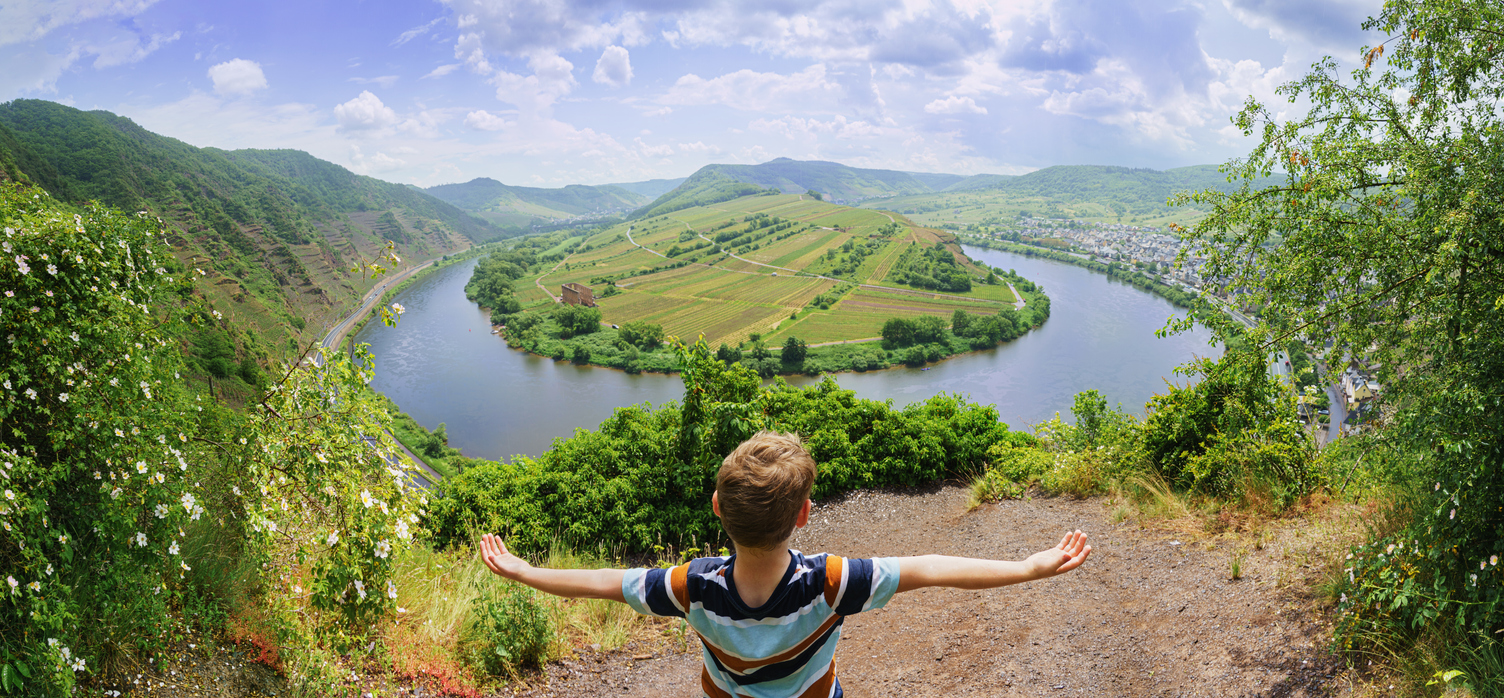Mosel Wine Region Germany: Wine Tasting Visitor’s Guide for 2025
Nestled in the enchanting landscapes of western Germany, the Mosel wine region is an ideal #Winetraveler destination that offers a rich blend of tradition, culture, and, of course, exquisite wines. This picturesque region, winding along the Mosel River between the Hunsrück and Eifel mountains, is renowned for its stunningly steep vineyards that beautifully reflect in the shimmering river below.
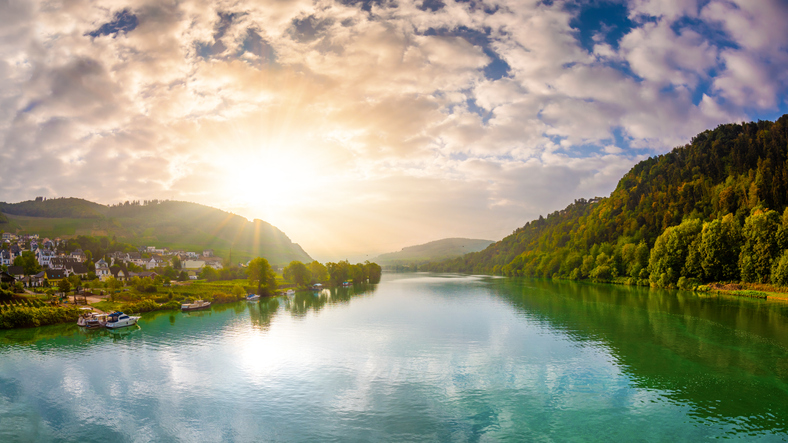
- Mosel Wine Region Germany: Wine Tasting Visitor's Guide for 2025
- Planning Your Visit to the Mosel Wine Region
- Vineyard Hotels in Mosel Germany (and more)
- Exploring the Wineries & Vineyards of the Mosel
- Mosel Gastronomy & Cuisine
- Outdoor Activities Around Mosel
- Cultural Attractions in Mosel
- Where to Buy Wine and Local Delicacies
- Souvenir Shopping in Mosel
- The History of Wine Making in Mosel
- Why Mosel is a Must-Visit for Winetravelers
- Tips for an Unforgettable Experience
- Frequently Asked Questions about Germany's Mosel Wine Region
The Mosel’s viticultural history dates back over 2,000 years, making it one of the oldest and most revered wine-producing areas in the world. Its unique geographical location and slate-rich soils create the perfect terroir for cultivating world-class Riesling, which the region is particularly celebrated for.
This year, more than ever, Mosel offers an enticing journey for Winetravelers. The Mosel wine region’s vineyards, wineries, and towns provide an immersive experience, offering visitors the chance to witness the painstaking and legendary German attention to detail involved in producing these sought-after wines.
RELATED: Best Destinations to Visit in Germany This Year and Why
Wander through the historic town of Bernkastel-Kues, admire the medieval architecture of Cochem, or lose yourself in the Roman ruins of Trier – each location is a testament to the region’s rich past.
The Mosel wine region is not just about the wines – it’s about the marriage of stunning landscapes, history, culture, and culinary delights. A visit here is a feast for all the senses, making it a must-visit destination for any discerning Winetraveler this year.
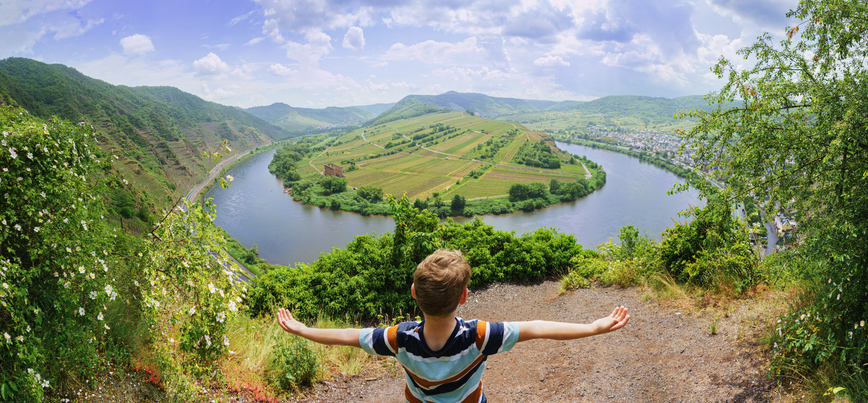
Planning Your Visit to the Mosel Wine Region
Main Towns of the Mosel Wine Region
Trier
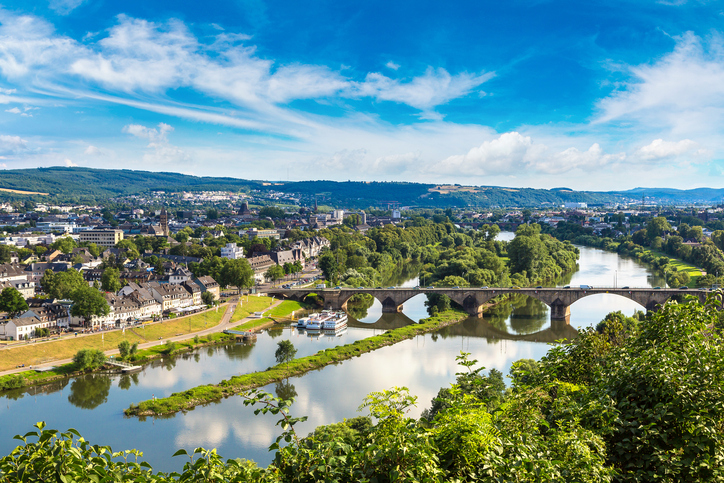
Trier is one of Germany’s oldest cities, often referred to as “The Rome of the North” due to its extensive Roman heritage. Among its numerous historical landmarks, the Porta Nigra gate and the Trier Cathedral stand out. Its thriving food scene, charming old town, and numerous wine estates nearby make Trier a great starting point for any Mosel journey.
Check Rates for the Best Hotels in Trier
Bernkastel-Kues
A picturesque town brimming with half-timbered houses and quaint cobbled streets, Bernkastel-Kues is a must-visit. The town’s medieval market square is particularly enchanting. Aside from its aesthetic allure, Bernkastel-Kues is renowned for its world-class vineyards, most notably the Bernkasteler Doctor.
Check Hotel Prices for the Best Hotels in Bernkastel-Kues
Cochem
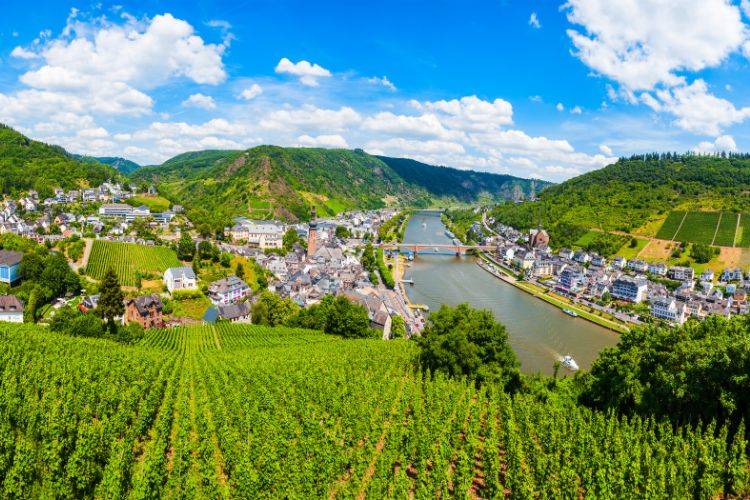
This delightful town is dominated by the impressive Reichsburg Castle, which looms high above on a hill, offering breathtaking views of the Mosel River and vineyards. Cochem’s narrow streets and squares, filled with traditional buildings and wine taverns, perfectly encapsulate the region’s charm.
RECOMMENDED: Take a River Cruise of the Mosel River and Experience Reichsburg Castle From the Water
Koblenz
Where the Mosel River meets the Rhine, you’ll find the vibrant city of Koblenz. Steeped in history, Koblenz offers plenty to explore, including the Ehrenbreitstein Fortress accessible via cable car. The city’s Deutsches Eck, a headland where the two rivers converge, is a symbol of German unity and a must-see.
Traben-Trarbach
Once the second-largest wine trading center after Bordeaux, Traben-Trarbach is a testament to the region’s winemaking history. Its unique Art Nouveau architecture, underground wine cellars, and the annual Christmas Market held within these cellars, create a distinct atmosphere that sets this town apart.
Check Hotel Prices in Traben-Trarbach
Zell
Famous for its “Zeller Schwarze Katz” (Zell’s Black Cat) wine, Zell is a lively wine town. It’s surrounded by steep vineyards and offers a range of wine-related activities, including tastings and guided vineyard tours. The charming town center, with its beautiful promenade along the Mosel, is a wonderful place to relax after a day of exploration.
Check Rates and Prices for Hotels in and Around Zell
Best Time(s) to Visit
The Mosel region is charming all year round, but if you’re particularly interested in wine, consider visiting between late August and October. This period, known as the harvest season, will let you witness the vineyards in full production mode. The region also hosts numerous wine festivals during this time, adding a festive vibe to your visit. Spring and early summer, with their blooming landscapes and milder weather, also make for pleasant travel.
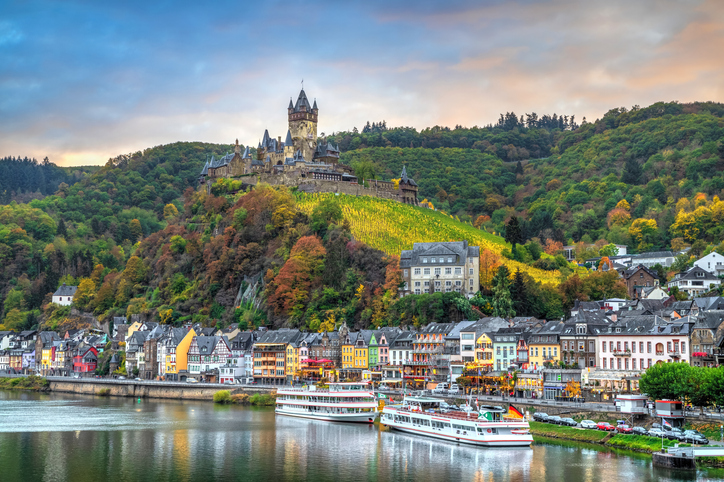
How to Get to the Mosel
The region is well-connected and easily accessible. The closest international airports are in Frankfurt and Cologne. Browse and compare current flight prices on Kayak to either airport here. From these cities, you can opt for a scenic train ride to Koblenz, Cochem, or Trier, some of the major towns in the Mosel region.
Alternatively, if you prefer road trips, renting a car will offer you the flexibility to explore the area at your own pace. Just be prepared for some winding roads and steep vineyards!
Getting Around the Mosel Wine Region
Once you’ve arrived in the Mosel wine region, there are several ways to explore its enchanting landscapes and historic towns.
By Car
Renting a car provides the most flexibility to navigate the region. It allows you to explore off-the-beaten-path vineyards and scenic overlooks that might not be easily accessible otherwise. Germany has well-maintained roads and clear signage. However, remember that some of the vineyard roads can be steep and narrow. Also, be mindful of the strict drinking and driving laws in Germany if you’re planning on wine tasting.
By Bicycle
For the more active Winetraveler, the Mosel region is perfect for cycling. The Mosel Cycle Route runs along the river from Trier to Koblenz, offering breathtaking views of the vineyards, castles, and charming villages. You can rent bicycles in most towns, and many hotels even offer them to guests such as the Moselhotel Sonnenuhr and Gastehaus zum Moseltal. Be sure to pack a picnic for a riverside lunch!
Public Transportation
The Mosel region is well-served by public transportation, including buses and trains that connect the major towns and some of the smaller villages. The train ride along the river is particularly scenic and is an experience in itself.
River Cruise
A river cruise on the Mosel is a leisurely and scenic way to travel between towns. Many companies offer day cruises or short trips that give you a different perspective on the vineyards and allow you to enjoy the region’s natural beauty. We highly recommend you book a cruise that leaves from Cochem.
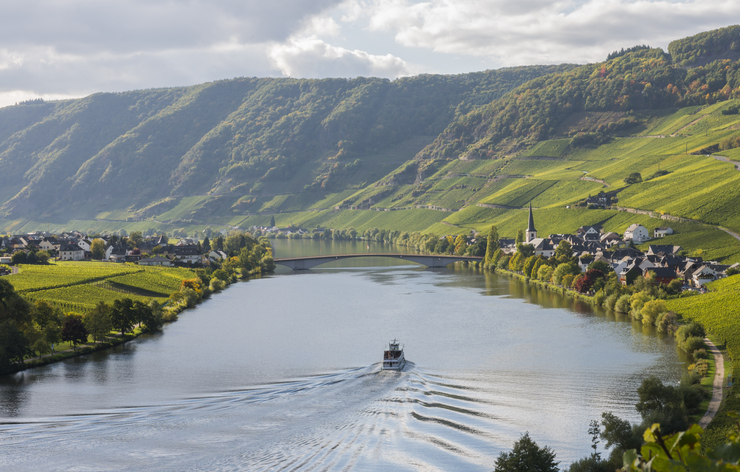
Walking
Lastly, don’t underestimate the power of your own two feet! Many of the towns and vineyards are compact and best explored on foot. There are also numerous hiking trails in the region, such as the Moselsteig, for those who wish to explore the vineyards and hills on foot.
Visa and Travel Requirements
Germany is part of the Schengen Area, so visitors from many countries can enter for up to 90 days without a visa for tourism purposes. However, regulations may vary depending on your country of origin, so it’s wise to check the latest information from the German Embassy or Consulate in your home country. Always ensure your passport is valid for at least six months from your planned date of return.
Vineyard Hotels in Mosel Germany (and more)
Vineyard Stays
Now, for the ultimate #Winetraveler experience – imagine waking up in the heart of a vineyard, surrounded by rows of grapevines, the river flowing quietly nearby. Staying at a vineyard or winery is a unique opportunity to get a behind-the-scenes look at winemaking in Mosel.
Properties like the Weingut Gästehaus in Lieser not only offer comfortable accommodation but also let you engage with winemakers, join guided vineyard tours, and taste the wines right where they are produced. It’s a dream come true for any wine traveler.
Luxury Hotels in Mosel
For those seeking a touch of luxury, the Mosel wine region doesn’t disappoint. Elegant properties such as the Schloss Lieser, housed in a restored castle, or the Bellevue Rheinhotel in Boppard, offer opulent rooms, fine dining, and panoramic river views.
After a day of wine tasting, unwind in a luxurious spa, take a dip in a heated pool, or simply enjoy the sunset over the river from your balcony.
Boutique Hotels and Guesthouses
If you’re looking for charm and personalized service, consider staying in one of Mosel’s boutique hotels or guesthouses. Many of these family-run establishments, like the Boutique-Hotel Jungenwald in Traben-Trarbach or the Weinromantikhotel Richtershof in Mülheim, offer individually designed rooms and a warm, welcoming atmosphere. They often feature locally sourced food and, of course, an excellent wine list.
Budget-Friendly Options
Traveling to the Mosel wine region doesn’t have to break the bank. You’ll find plenty of budget-friendly accommodation options, from cozy B&Bs to modern hostels and self-catering apartments. Many budget accommodations still offer excellent locations close to the vineyards or in the heart of the picturesque towns. Plus, the money you save on lodging can be spent on tasting more of the fabulous wines the region has to offer!
Exploring the Wineries & Vineyards of the Mosel
Mosel’s vineyards are a fascinating study in resilience and harmony with nature. Many vineyards are planted on steep, south-facing slopes that capture optimal sunlight. The slate-rich soil retains heat and provides excellent drainage, both crucial for the slow-ripening Riesling grapes. The region’s cool, continental climate further allows the grapes to retain their acidity, adding to the distinct characteristics of Mosel wines. All these factors interplay in a beautiful symphony, resulting in wines that are much celebrated for their complexity and finesse.
Best Mosel Wineries to Visit
The Mosel wine region is dotted with numerous exceptional vineyards. Weingut Dr. Loosen, near Bernkastel-Kues, is world-renowned for its Rieslings. Weingut Markus Molitor, one of the largest and oldest family-owned wineries, offers a range of wines from different vineyards along the Mosel. For a panoramic view of the river, visit the steep vineyards of Weingut Joh. Jos. Prüm in Wehlen. Each vineyard offers a unique perspective on the tradition and innovation that shapes Mosel’s wine scene.
Riesling-focused Wineries
Mosel is inextricably linked with one grape variety – Riesling. This versatile grape thrives in the region’s cool climate and slate soils, producing wines that range from bone-dry to lusciously sweet.
Weingut Clemens Busch is known for its organic and biodynamic approach to Riesling cultivation, while Weingut Fritz Haag has a stellar reputation for its sweet Rieslings. Visiting these and other Riesling-focused vineyards offers an opportunity to delve deeper into the world of this noble grape.
Mosel Wine Tours & Vineyard Experiences
For a Winetraveler, no visit to Mosel is complete without a vineyard tour and wine tasting. Most wineries within the region offer guided tours where you can learn about the winemaking process, from the vine to the bottle. Walking among the steep, terraced vineyards, you’ll gain a deeper appreciation for the winemakers’ craft. After most tours, you can sample a selection of wines, often accompanied by local cheeses or other local delicacies. It’s a sensory experience that truly connects you with the region and its wines.
While many of the wineries we mentioned above offer their own tours, local tour operators offer more intimate experiences and can provide more recommendations on ideal wine bars, restaurants beyond the wineries. Below, find some of our most highly-rated and booked wine tours in Mosel when planning your trip.
Grape Escape Mosel – Personal Wine Tours
Germany’s winemaking legacy dates back to Roman times when the first vineyards took root on the Mosel’s steep slate slopes. Today, the region invites you to embark on a delightful journey—a Grape Escape—that immerses you in the enchanting realm of Riesling.
Experience the diversity of this renowned wine region by exploring a combination of internationally recognized and family-run boutique vineyards, each steeped in tradition and passion. These vineyards are the very heart of the Mosel, producing some of the most revered wines globally.
Your personal tastings will be a celebration of Riesling—the region’s crowning glory. Savor its various expressions, from bone-dry to late-harvest sweetness, each reflecting the unique soils of blue, red, and grey quartzite slate from which they’re grown. But the Mosel’s bounty doesn’t stop at Riesling. You’ll also have the chance to discover Germany’s acclaimed Pinot Noir, known as Spätburgunder, and indulge in their exceptional sparkling wines.
Embracing open minds and open wines, we welcome all thirsty Winetravelers to join this exciting journey. The more, the merrier! If, however, you prefer a private tour, please let us know. An additional fee may be required, depending on seasonal demand.
Koblenz – Old Town with the Ehrenbreitstein Fortress
Explore the UNESCO-listed Rhine Valley city of Koblenz on a private walking tour, where history meets the riverside. Traverse the charming Old Town and ascend to the iconic Ehrenbreitstein Fortress, all in a compact three-hour itinerary. Enjoy the flexibility of morning, afternoon, or evening departure times and benefit from the personalized attention of your private guide. The breathtaking views over the Rhine Valley from the fortress are a highlight not to be missed.
Mosel Half-Day Wine Tour
Dive into the world of winemaking in the picturesque Mosel Valley on this intimate half-day tour. Beyond bus travel, this experience invites you to explore hillside wineries on foot, tour processing facilities, and enjoy a curated wine-pairing session. Ideal for active wine enthusiasts, this tour ensures personalized attention and an educational immersion into local viticulture. It’s a delightful experience, perfect for families or friends seeking a blend of outdoor activity and fine wine.
Customizable Guided Tour of Trier
Experience the historical charm of southwestern Germany with a prebooked Private Walking Tour of Trier. Avoid crowded group tours and enjoy a personalized journey through the city’s most striking landmarks such as the Porta Nigra, St. Gangolf Church, Saint George’s Fountain, and the Electoral Palace. A dedicated guide will accompany you, offering exclusive insights into Trier’s rich history. This private tour ensures a comprehensive and engaging exploration tailored just for your group.
Mosel Gastronomy & Cuisine
Iconic Dishes of Mosel
Just like its wines, Mosel’s cuisine is a delightful reflection of the region’s rich culture and fertile landscape. For meat lovers, “Sauerbraten” (a pot roast, usually beef, marinated before being slow-cooked) is a must-try. In many places, it’s served with “Kartoffelklöße” (potato dumplings), red cabbage, and a rich gravy. For those with a sweet tooth, the “Zwetschgenkuchen” (plum cake) or “Apfelstrudel” (apple strudel) are irresistible. Don’t miss the chance to taste the local fresh river fish, often grilled or smoked.
Pairing Local Wines with Food
The diversity of Mosel wines offers a wealth of pairing possibilities. A crisp, dry Riesling pairs beautifully with the region’s freshwater fish, while the slightly sweeter Kabinett style complements spicier dishes or roasted pork. The noble sweet Auslese, Beerenauslese, or Trockenbeerenauslese wines make a heavenly match with desserts or can be enjoyed as a dessert on their own.
Recommended Mosel Restaurants and Cafés
Mosel is dotted with excellent eateries that showcase local cuisine. Alte Zunftscheune (Neue Rathausstraße 15, 56841 Traben-Trarbach, Germany), in in Traben-Trarbach, serves traditional dishes made from locally sourced ingredients.
For a gourmet treat, head to Restaurant Schanz (Bahnhofstraße 8A, 54498 Piesport, Germany) in Piesport, which also has earned a Michelin star.
When it comes to cafés, CAFÉ ALLERLEI (Neustraße 27, 54290 Trier, Germany) in Trier is a charming spot for a coffee and cake break.
While all of the above work, Winetravelers will appreciate, Vinothek in the vaulted cellars of the St. Nikolaus-Hospital, which offers a selection of over 160 local wines by the glass, perfect for an evening of relaxed wine exploration.
Outdoor Activities Around Mosel
Hiking and Cycling Routes
Mosel is a paradise for outdoor enthusiasts, with a vast network of hiking and cycling trails that wind through vineyards, forests, and charming villages. One of the most popular cycling routes is the Mosel Radweg, a well-marked trail that runs along the river. For hikers, the Moselsteig offers over 365 kilometers of trails, with stunning views of the vineyards and river below. Whichever path you choose, you’ll be rewarded with breathtaking landscapes and plenty of opportunities to stop at wineries along the way.
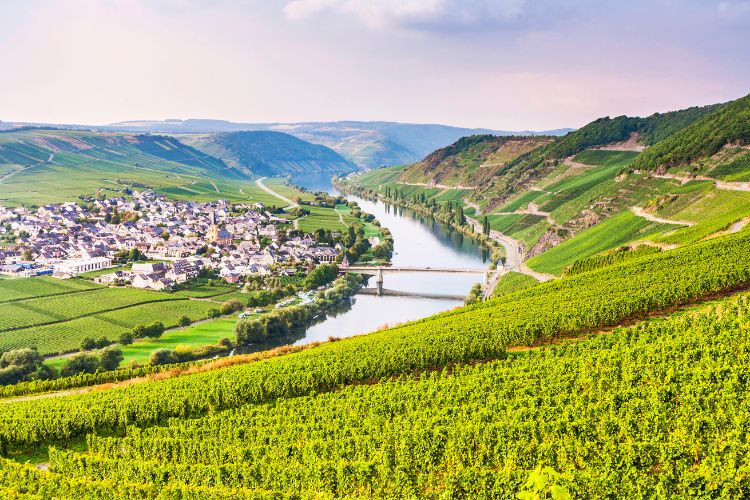
River Cruises on the Mosel
A cruise on the Mosel River offers a different perspective on the region’s beauty. You can sit back and relax as you glide past terraced vineyards, medieval castles, and picturesque towns. Many companies offer a variety of cruises, from short trips to full-day journeys, and some even include wine tasting on board. Whether you choose a leisurely afternoon cruise or a romantic sunset voyage, it’s an experience not to be missed.
Picnics and Outdoor Wine Tasting
One of the joys of visiting the Mosel region is the opportunity to enjoy its natural beauty while savoring local wines and cuisine. Many wineries offer outdoor wine tasting experiences, where you can sip their offerings amidst the vines. Or, hire a private guide for a walk through the vineyards. For a more casual experience, pack a picnic with local cheeses, cured meats, and a bottle of Mosel Riesling, then find a spot along the river or in a vineyard. It’s a simple pleasure that encapsulates the essence of Mosel: great wine, delicious food, and stunning scenery.
Cultural Attractions in Mosel
Historic Towns and Villages
Stepping into the towns and villages of Mosel is like stepping into a time machine. Places like Cochem, with its half-timbered houses and imposing Reichsburg Castle, or Bernkastel-Kues, with its medieval market square, are steeped in history.
Trier, one of Germany’s oldest cities, brims with Roman ruins, including the Porta Nigra, a UNESCO World Heritage site. Each town and village in Mosel has its own unique charm and story to tell.
Architectural Highlights
Beyond the quaint towns and vineyards, Mosel is home to remarkable architectural gems. The Burg Eltz, a majestic castle nestled in the hills, looks as though it’s been lifted straight from a fairy tale. The Mosel Valley Bridge, a marvel of modern engineering, stands in stark contrast to the Roman Bridge in Trier, a testament to the region’s architectural diversity. And let’s not forget the countless wineries, many housed in beautifully restored historic buildings.
Museums and Art Galleries
For culture vultures, Mosel offers a range of museums and art galleries. The Mosel Wine Museum in Bernkastel-Kues provides fascinating insights into the region’s winemaking history. In Trier, the Rheinisches Landesmuseum houses one of the most important archaeological collections in Germany.
Art lovers should visit the Art Forum in Wittlich, which hosts rotating contemporary art exhibitions.
Local Festivals and Wine Events
Experiencing a local festival is a great way to immerse yourself in Mosel’s culture. The region hosts numerous wine events throughout the year, the most famous being the Bernkastel-Kues Wine Festival in September. Expect wine parades, live music, fireworks, and, of course, plenty of opportunities to taste the region’s outstanding wines. These events offer a lively and fun atmosphere where locals and visitors alike come together to celebrate the region’s wine heritage.
Where to Buy Wine and Local Delicacies
As you might expect, the Mosel region is an excellent place to shop for wine. Most wineries have shops where you can purchase their wines directly, often at very competitive prices. For a broader selection, visit the Vinothek in the Wine Cultural Centre in Bernkastel-Kues, which stocks a wide range of wines from the region. In addition to wine, you’ll also find a variety of local delicacies on offer. Check out the local markets, such as the weekly market in Cochem, for regional products like honey, cheese, cured meats, and preserves.
Souvenir Shopping in Mosel
Looking for a special memento to remember your trip by? Mosel has plenty of shopping opportunities. Many towns have charming shops where you can find traditional German crafts, handmade jewelry, and unique home decor items.
Consider purchasing a piece of ‘blue slate’, a distinctive rock used in local vineyards and often crafted into decorative items. In the spirit of the region, you could also pick up a set of locally made wine glasses, perfect for savoring Mosel wine once you’re back home. Whether it’s a piece of local art or a bottle of your favorite Riesling, you’re sure to find a keepsake that will remind you of your memorable journey through the Mosel wine region.
The History of Wine Making in Mosel
Wine has been an integral part of Mosel’s culture for over 2000 years. The region’s winemaking history can be traced back to the Roman era, but it was during the Middle Ages that Mosel truly established itself as a significant wine region. The steep slopes along the river, which the Romans had begun to terrace, were further developed during this time. Monasteries played a key role in advancing viticulture and winemaking techniques.
In the 19th century, Mosel wines, particularly the Rieslings, were highly prized and often commanded higher prices than even the finest Bordeaux wines. However, the region saw a decline in the 20th century due to world wars and changes in consumer preferences. Recently, there’s been a resurgence of interest in Mosel wines, with winemakers embracing both traditional methods and innovative practices.
Stuart Pigott, a renowned wine critic, once said, “The Mosel’s Riesling wines have a combination of delicacy and power, which is unequaled anywhere else in the world.” This testifies to the enduring appeal and unique character of Mosel wines.
The Roman Influence on the Region
The Romans left an indelible mark on the Mosel region, from architecture to viticulture. They introduced systematic vine cultivation and wine production to the region, recognizing the potential of the steep, slate-rich slopes for growing grapes. Even today, remnants of ancient Roman press houses can be found in the area.
The city of Trier, known as “the Rome of the North,” houses several well-preserved Roman structures, including the Porta Nigra, the Amphitheater, and the Imperial Baths. These monuments, along with the ancient vineyards, serve as a constant reminder of the profound Roman influence on the region.
As Dr. Markus Trier, director of the Rheinisches Landesmuseum in Trier, put it, “The Mosel region is like an open-air museum, where you can literally touch history and see how the Romans shaped the landscape and culture.”
Understanding the Mosel AOC (Appellation d’Origine Contrôlée) System
Although the term ‘AOC’ is French and not typically used in Germany, the concept of regulating wine quality and origin is very much prevalent in the country. Germany’s equivalent is the ‘Qualitätswein bestimmter Anbaugebiete’ (QbA) and ‘Prädikatswein’ system.
In Mosel, wines are categorized based on their sweetness level (from dry to sweet), grape ripeness at harvest, and origin. The top-quality wines are often designated as ‘Einzellage’ (single vineyard wines), which means the grapes come from a specific, named vineyard. This system helps to preserve the distinct identities of the wines and provides consumers with a guarantee of the wine’s quality and origin.
Caro Maurer, a Master of Wine, explains, “The German wine classification system is complex but allows for a rich expression of the diversity of our vineyards. Each wine tells a story of its origin.”
Mosel Educational Visits and Winemaking Workshops
For those keen to learn more about wine, the Mosel region offers a variety of educational opportunities. Many wineries provide detailed vineyard and cellar tours that delve into the winemaking process.
For a more hands-on experience, consider enrolling in a winemaking workshop. Places like the Mosel Wine Museum offer workshops where you can learn about the art and science of winemaking, from grape cultivation to fermentation and aging.
Dr. Rowald Hepp, the director of Schloss Vollrads, one of the oldest wine estates in the world located in the neighboring Rheingau region, but with deep knowledge of German wine culture, says, “Winemaking workshops are a great way to get a deeper understanding of the passion, knowledge, and skill that goes into each bottle of wine. You’ll not only learn about the process, but also gain a greater appreciation for the complexity and beauty of wine.”
Furthermore, the region is home to several institutions offering more formal wine education, including the Hochschule Geisenheim University, which offers degree programs in viticulture and enology. Whether you’re a wine novice or an experienced oenophile, there’s always something new to learn in Mosel.
Why Mosel is a Must-Visit for Winetravelers
Mosel, with its steep, sun-drenched slopes and centuries-old winemaking traditions, is truly a paradise for Winetravelers. The region offers a spectacular blend of scenic beauty, cultural richness, and, of course, world-class wines, especially its signature Rieslings. But it’s not just the wine that makes Mosel special. It’s the chance to meet the winemakers, to walk the same ground where the grapes grow, and to understand the passion and craftsmanship that goes into every bottle. As a Winetraveler, you’ll be able to peel back the layers of this historic region and truly appreciate the magic of Mosel.
Tips for an Unforgettable Experience
Preparation is key to making the most of your visit to Mosel. Research and book your accommodations and vineyard visits in advance, especially during peak season. Remember, many vineyards still operate on a small scale and appreciate advance notice. Don’t shy away from hiring a local guide or joining a wine tour – their insider knowledge can greatly enrich your experience.
Learning a few basic German phrases will go a long way, and always make sure to carry cash as not all places accept credit cards. Remember to pace your wine tastings and stay hydrated—it’s easy to lose track when faced with so many excellent wines. Finally, keep an open mind and palate. You may come for the Rieslings, but don’t miss the chance to taste other local varieties like Müller-Thurgau or Elbling.
Below are some handy German phrases and wine-related terms to add to your language repertoire:
- “Ich hätte gerne eine Weinprobe” – “I would like a wine tasting.”
- “Können Sie mir einen lokalen Wein empfehlen?” – “Can you recommend a local wine?”
- “Eine Flasche von diesem, bitte” – “A bottle of this one, please.”
- “Welcher Wein passt am besten zu diesem Gericht?” – “Which wine pairs best with this dish?”
- “Ist dieser Wein trocken, halbtrocken oder süß?” – “Is this wine dry, off-dry, or sweet?”
- “Wo ist das nächste Weingut?” – “Where is the nearest winery?”
As a Winetraveler, your journey to Mosel is more than a vacation—it’s an opportunity to connect with a place and its people through the universal language of wine. Enjoy every moment of it. Prost!
Frequently Asked Questions about Germany’s Mosel Wine Region
You are reading “Ultimate Travel Guide to the Mosel Wine Region” Back to top
Mosel wine region travel guide, things to do in Mosel Germany
If you enjoyed this guide, make sure you register to become a Winetraveler for free! You’ll get access to all of our content and receive useful guides and inspiration for travel around the world. Be sure to follow along with us on Twitter and Instagram as we continue to feature more exciting destinations.
